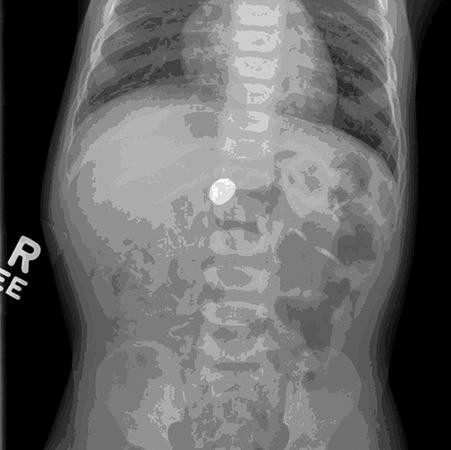From the Academy of Pediatrics
Button batteries can cause injuries, death if swallowed
- Parent Plus
When you need to change a button battery, hunting down a screwdriver to open the tiny lid that covers the battery may seem like a nuisance. But the American Academy of Pediatrics urges parents to make sure the lid is closed tightly to keep the batteries out of children’s reach.
Children can suffer serious injuries or die if they swallow button batteries. Injuries are most common in children under 5 years old.
 Children can suffer serious injuries or die if they swallow button batteries. Photo courtesy of Robert E. Kramer, M.D.
Children can suffer serious injuries or die if they swallow button batteries. Photo courtesy of Robert E. Kramer, M.D.The batteries are used in toys, remote controls, thermometers, hearing aids, calculators, bathroom scales, key fobs, cameras and holiday ornaments.
Lithium batteries the size of a penny or larger are the most dangerous, and even dead batteries are harmful when swallowed. Smaller batteries also can get caught in the esophagus, or children can put them in their ears or nose.
If you think your child may have swallowed a button battery, go to the emergency room right away. Batteries can cause serious burns within two hours of being swallowed, so they need to be removed as soon as possible. Children also have died after batteries were removed because of tissue damage that caused massive internal bleeding.
A child who swallows a button battery may have the following symptoms: blocked airway, wheezing, drooling, vomiting, chest pain, trouble swallowing, no appetite or coughing and gagging when eating.
Children who put batteries in their ear may have drainage from the ear, pain, hearing loss or facial paralysis. If a battery is put into a nostril, it can cause nasal tissue injury, infection and damage or holes in the cartilage that separates the nostrils.
To keep children safe from button battery injuries:
- Use screws provided and tape to keep battery compartments sealed shut.
- Keep loose batteries out of children’s reach. Never place batteries in cups or near pill bottles.
- Check with your garbage company or local authorities to find out how to recycle batteries. Authorities advise placing tape on both sides of the dead battery and storing it in a zip bag out of children’s reach.
